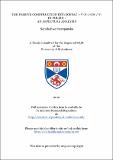The passive construction być/zostać + V-n-/-on-/-t- in Polish : an aspectual analysis
Abstract
The idea that passive sentences are equivalent in meaning to their active counterparts
has raised numerous questions among linguists particularly for the last several decades.
The main dilemma regarding this relationship concerns the very need for an alternative
synonymous construction such as the passive. The focus has mostly been on issues
concerning the preference for using passive sentences in certain types of discourse as
well as the divergent liking for and frequency of using passive in different languages.
However, apart from these concerns, there have gradually appeared questions and
doubts related to the very nature and meaning of the passive. Many linguists have
argued that the passive and its corresponding active are not synonymous (Ziff 1966:
226) and that “most sentences that are good in the active voice are just grotesque
curiosities when put into the passive voice” (Allen 1974: 277). Moreover, some actives
and passives do not have counterparts in the other voice (Davison 1981: 440). Not only
has the semantic equivalence between passives and actives been questioned but also the
syntactic correlation, which led linguists to search for new theories and put forward
alternative hypotheses.
The following work aims to present one of the alternative approaches towards
the passive. It is based on the aspectual analysis of the passive and the method of lexical
exceptions advanced and applied to English, German, and Russian in Beedham (2005).
In this dissertation the method of lexical exceptions will be implemented in an analysis
of the passive in Polish and it will be shown that the voice analysis of the passive in
Polish is misguided and an alternative aspectual analysis provides answers and
explanations to inconsistencies associated with the generally accepted voice analysis of
the Polish passive. The dissertation consists of three main parts, which discuss the
theoretical background of the passive in general and in Polish; problems associated with
the universal definition of passive and synchronic solutions based on an aspectual
analysis; and issues concerning the Polish passive, with a presentation of a new
alternative analysis of the być/zostać + V-n-/-on-/-t- construction.
Type
Thesis, MLitt Master of Letters
Collections
Items in the St Andrews Research Repository are protected by copyright, with all rights reserved, unless otherwise indicated.

